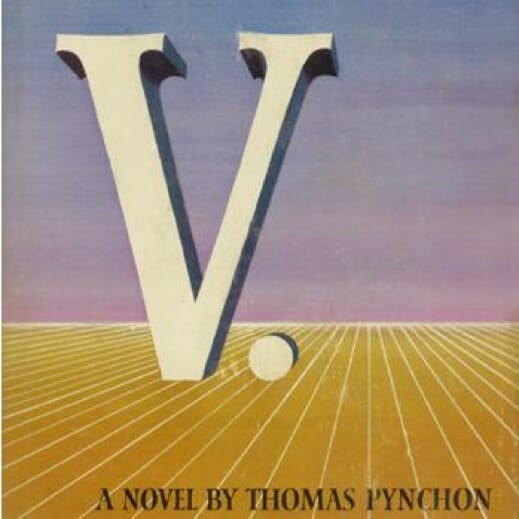V. by Thomas Pynchon
V. for Vital

Thomas Pynchon has been able to fall asleep for the last 50 years knowing his first novel was V. It stands as a testament to his talent that this first foray into the world of long-form prose arrived neither apocryphal nor underdeveloped. Pynchon came out of the batter’s box with a home run on his first swing.
V. tells a story beyond the capabilities of traditional narrative. It focuses on the lives of Benny Profane, a war vet who wanders New York City searching for meaning, and Herbert Stencil, an intellectual on his own quest—he seeks a mysterious woman, V., described in his father’s diary. Profane’s journey largely happens on and under city streets. Stencil wanders and swerves the open road.
Pynchon studied engineering physics at Cornell University, briefly interrupting his tenure there to serve in the U.S. Navy. While at school, he attended lectures taught by Vladimir Nabokov, whose own playful prose style influenced him. Like Profane, Pynchon returned from service a wanderer and a polymath, his experience as a vet-come-home punctuating his novel with realism and honesty.
Fans regularly proclaim Pynchon as the father and most intricate designer of postmodern hip lit. There’s something to this. The writer name-checks and digresses more than any writer since Kerouac, with his wanderlust ramblings. Pynchon proves more verbose than Vonnegut or Salinger too. I mention these specific writers because their themes turn up in V., as protagonist Benny Profane searches, like Sal Paradise or Holden Caulfield, for place and identity. Consider, too, Stencil’s quest for the mysterious V., the feminine presence in dad’s diary. Pynchon sends us down rabbit trails of socio-cultural-historical sound bytes mixed with paragraphs of smirky humor. Presto! We get On the Road written by the type of intellectual who solves the New York Times crossword in three minutes flat.
What does V. have that other early post-war literature lacks? It emphasizes the creation of a sort of modern mythology. Digressions of both idea and narrative here prove hard to track and understand at times but the mode of storytelling stretches far back from the postmodern era. Joyce first did it for the moderns with Ulysses, writing a Homeric odyssey for a generation in which heroism lay dead. V. reads as equal parts Odyssey and Ovid’s Metamorphoses. (Homer can hardly be considered a straight-line storyteller himself … and Ovid’s work splashed and ran haphazardly, headed here and there in its efforts to encompass all the stories the Greco-Romans ever told.) The old Greek and the old Roman told their stories to feel a bit more entrenched in the world aswirl around them. Fast forward to 1963 America, and it becomes apparent Pynchon set the same goal for himself.
V. reminds us that we never really made it that far away from ancient polytheism. Benny Profane walks the streets of New York City alternating between spells of Erotic and Bacchic revelry. As wanderer back from the war—an archetype as old as written words—Profane lacks a Penelope or homeland where he might end his voyage. Herbert Stencil finds his quest for the Holy Grail undercut with the eternally unknowable.
Proponents claim that postmodernism’s purported edge on other viewpoints is its emphasis on deconstruction, a dismantling of preconceived notions and theisms. But V. insistently reminds its readers, with impressive amounts of foreknowledge, that the search will stick even if the destination doesn’t. To claim humanity and not be looking for something more, whatever that more might be, comes as a contradiction in terms.